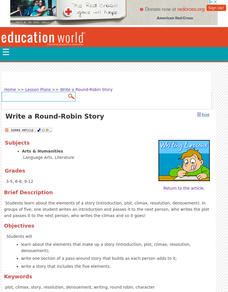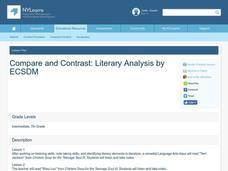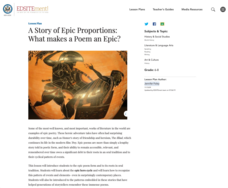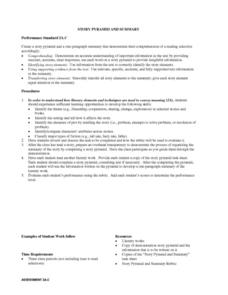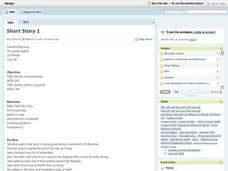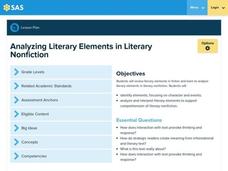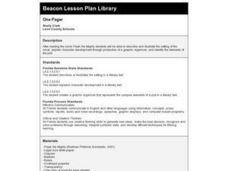Curated OER
A Togolese Tale: The Big Fire
Students identify common elements found in folk tales and read a Togolese folk tale told by Fred Koehler. They analyze the folk tale for its elements and compare and contrast it with well-known Western folk tales.
Curated OER
The Star Fisher
What a terrific way to discuss racism in the 1920's. Learners read a story called The Star Fisher by Laurence Yep. It is about a Chinese American girl who experiences racism and prejudice after moving from Ohio to West Virginia....
Curated OER
Whodunnit?
Want to create an exciting mystery activity? Investigators will identify the elements of a mystery, review mystery stories, then write their own mysteries. They engage in forensic science experiments related to mysteries and learn to ask...
Curated OER
Setting the Story: Techniques for Creating a Realistic Setting
“It was a dark and stormy night.” Thus begins the 1830's novel Paul Clifford and, of course, all of Snoopy’s novels! Encourage young writers to craft settings for their stories that go beyond Edward Bulwer-Lytton’s often-mocked phrase...
Curated OER
Write a Round-Robin Story
Students discover the elements of a story (introduction, plot, climax, resolution, denouement). In groups of five, one student writes an introduction and passes it to the next person, who writes the plot and passes it to the next person,...
Hawaiʻi State Department of Education
Story Design
Stories contain very specific elements; plot, characters, and key events. Learners use pantomime to retell a key event from the beginning, middle, and end of a story. They discuss setting and character as each group discusses and then...
Curated OER
Where
Kindergartners identify where a story takes place. In this literature lesson plan, learners take a picture walk and discuss how pictures can provide clues to the location of the story. They then illustrate where a new story of their own...
Rainforest Alliance
Knowing the Essential Elements of a Habitat
To gain insight into the many different types of habitats, individuals must first get to know their own. Here, scholars explore their school environment, draw a map, compare and contrast their surroundings to larger ones. They then...
Facebook
Respect and Boundaries
Respect is a must-have in healthy relationships! Pupils explore their boundaries and identify the elements of respect during a lesson plan from a library of digital citizenship activities. The teacher's resource section contains a...
Curated OER
Compare and Contrast: Literary Analysis
Seventh graders are able to use active listening skills, take notes and identify literary elements of a short story. They use/create graphic organizer, compare/contrast literary elements from various stories and compare and contrast traits.
Curated OER
Identifying Structured Patterns in Folk Tales
Students are introduced to the structure of folk tales. After working through an example, they identify as many folk tales as possible that follow the same pattern. In groups, they compare a folk tale and a fairy tale to identify the...
National Endowment for the Humanities
A Story of Epic Proportions: What Makes a Poem an Epic?
Learners analyze the epic poem form and its roots in oral tradition. In this epic poetry lesson, students research the epic hero cycle and recognize the pattern of events and elements. Learners analyze the patterns embedded in the stories.
Curated OER
Story Pyramid and Summary
Students read a short selection of a story individually or as a class. On their own, they create a story pyramid for the selection and write a one page summary. They use text from the story for their supporting details. To end the...
Curated OER
Short Story
Seventh graders identify the various elements of a short story. After reading Rudyard Kipling's short story, "Rikki-Tikki-Tavi," students identify the author's purpose in writing the story as well as the elements that make it a short...
Pennsylvania Department of Education
Analyzing Literary Elements in Literary Nonfiction
Fourth graders identify the literary elements of a nonfiction text. In this literary elements lesson, 4th graders read the text Piano Starts Here--The Young Art Tatum and fill in a chart that includes the events from the book....
Curated OER
One Pager
Young scholars read the novel, Freak the Mighty and describe and illustrate the setting. They create a graphic organizer that demonstrates the major plot elements and character development.
Curated OER
Building a Literature Pyramid
Pupils create a literature pyramid. They review and discuss their assessment task and rubric and select the literature for their pyramid. They read the literary selection and complete a pyramid sheet for one of the four literary...
Curated OER
Character Traits in Fables
Combining art, music, dance, and reading comprehension, this lesson is geared to reach all ability levels. After reading a variety of fables and discussing story elements and character traits, class members select a moral to use as the...
Curated OER
Identifying the Theme in a Story
Middle schoolers recognize Theme through the use of simple, short stories. Using Pro Quest, students begin by researching the literary element, theme, and how it can be identified. They then identify the themes in Aesop's...
Curated OER
Explore the Elements of Art
Young scholars recognize elements of art such as texture, shape line and color. In this elements of art lesson, students create a still life picture with oil pastel or crayons. Young scholars define elements of art...
Curated OER
One Story, Many Tales
Students compare and contrast various versions of the fairytale Cinderella. In this folktale activity, students read The Korean Cinderella and The Egyptian Cinderella and analyze the differences between the two stories. Students identify...
Curated OER
Text Elements of Fiction and Nonfiction
Second graders examine the text elements associated with fiction and nonfiction texts. In this text elements lesson plan, 2nd graders listen to Anansi and the Moss Covered Rock by Eric A. Kimmel. They take formative assessments to...
Curated OER
Identifying Main Idea and Supporting Details - The Stonecutter's Wish
Students identify details that support the theme of a story. For this main idea or theme lesson, students view a video of "The Stonecutter's Wish." Students are given a graphic organizer to use as they discuss the main idea...
Curated OER
Story Maps and Boxes
Students use a story map template to review the parts of a story and information about a book that they have read. The elements of the story are identified and placed into story boxes and shared with classmates.






